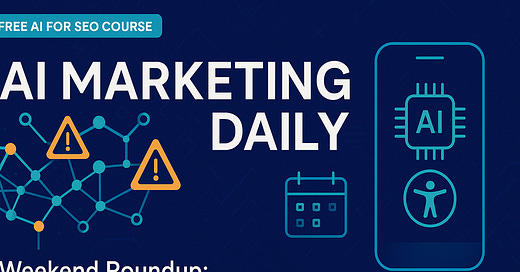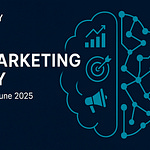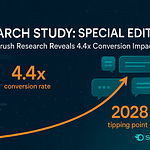This weekend brought significant revelations about Google's AI Overviews reliability issues, new research showing their dramatic expansion, and crucial insights about content strategy in an AI-driven search landscape. Discover how technical glitches are undermining trust whilst AI search features continue their rapid expansion across global markets.
Story #1: Google's AI Overviews Suffer Weekend of Embarrassing Technical Failures
Sources: TechCrunch (published 30th May 2025) & Search Engine Land (published 29th May 2025)
URLs:
https://techcrunch.com/2025/05/30/google-fixes-bug-that-led-ai-overviews-to-say-its-now-2024/
https://searchengineland.com/is-it-tuesday-google-ai-overviews-456194
What Happened: Google faced a weekend of significant technical embarrassment as multiple publications exposed fundamental accuracy failures in AI Overviews. TechCrunch revealed that when users asked Google's AI whether the current year is 2025, it confidently stated it was 2024. Search Engine Land's investigation uncovered even broader reliability issues, finding systematic confusion about basic factual queries including days of the week, with AI Overviews providing conflicting information about fundamental temporal facts. Some queries triggered no AI Overview at all, whilst others delivered completely incorrect day-of-week information. Google fixed the date bug late Thursday but offered no technical explanation beyond saying they were "working on updates to address this type of issue."
Why It Matters: These reliability failures highlight a critical gap between AI search technology's massive scale and its fundamental accuracy requirements. With AI Overviews now serving billions of users globally, getting basic facts wrong undermines trust in the entire system. For marketers, this weekend demonstrates that whilst AI features cannot be ignored due to their reach, they cannot be fully trusted for accurate brand representation. The timing is particularly concerning given Google's continued aggressive expansion of AI features across multiple platforms and markets.
Suggested Actions:
Implement comprehensive monitoring systems to track how AI Overviews represent your brand and industry information across different queries
Develop backup content strategies that don't rely solely on AI search features, maintaining traditional SEO approaches as insurance against AI unreliability
Story #2: Android Things We Announced - Google Unveils AI-Powered Accessibility Breakthroughs
Source: TechCrunch (published 15th May 2025)
URL: https://techcrunch.com/2025/05/15/google-rolls-out-new-ai-and-accessibility-features-to-android-and-chrome/
What Happened: Google announced significant AI-powered accessibility enhancements for Android and Chrome in recognition of Global Accessibility Awareness Day. The flagship development is an upgraded TalkBack screen reader that integrates Gemini AI, allowing users to ask contextual questions about on-screen images and content (such as "What colour is this guitar?" or "Is there a discount on this item?"). The update also includes enhanced speech recognition tools, improved navigation features, and AI-powered content description capabilities that make digital experiences more accessible to users with vision and hearing impairments.
Why It Matters: These developments represent AI technology's positive potential whilst the search reliability issues show its current limitations. For marketers, the accessibility improvements signal important shifts in how content will be consumed and interpreted. As AI-powered accessibility tools become standard features rather than specialised add-ons, marketing content must be optimised for AI interpretation and description. The integration of Gemini AI into core Android accessibility features indicates that inclusive design is becoming central to AI development, not an afterthought.
Suggested Actions:
Audit your visual marketing content for compatibility with AI-powered accessibility tools, ensuring images and graphics can be effectively described by AI systems
Implement inclusive design principles as core components of your AI content strategy, considering how AI will interpret and explain your content to users with different accessibility needs
Comprehensive Analysis: The Weekend That Revealed AI Search's Growing Pains
Comprehensive Analysis: The Weekend That Exposed AI's Promise and Perils
This weekend's developments perfectly encapsulate the current state of AI technology: remarkable advances in specific applications alongside fundamental failures in basic functionality. The contrast between Google's impressive accessibility innovations and embarrassing reliability failures reveals the uneven nature of AI development and deployment.
The Reliability Crisis
The weekend's systematic failures in AI Overviews—from date confusion to day-of-week errors—represent more than isolated bugs. They expose a fundamental challenge in AI systems: the gap between processing capability and factual accuracy. When Search Engine Land and TechCrunch both investigate and find different aspects of the same reliability problems, it signals systemic issues rather than edge cases.
For marketers, these failures create a strategic paradox. AI Overviews have massive reach and influence, making them impossible to ignore. Yet their demonstrated unreliability means they cannot be trusted as the primary channel for brand representation. The weekend's events underscore the need for monitoring systems and backup strategies.
Accessibility as AI's Success Story
In contrast to the search reliability issues, Google's Android accessibility announcements demonstrate AI technology delivering genuine value. The integration of Gemini AI into TalkBack represents thoughtful application of AI capabilities to solve real problems. When users can ask AI to describe images or explain on-screen content, it creates meaningful improvements to digital accessibility.
This positive application highlights an important strategic consideration for marketers: AI's success often depends on solving specific, well-defined problems rather than attempting to replace broad human capabilities. The accessibility features work because they augment human abilities rather than trying to replicate human judgment about complex topics.
Content Strategy Implications
The weekend's developments have significant implications for content strategy. The reliability issues emphasize the importance of creating content that works regardless of how AI systems interpret or present it. Meanwhile, the accessibility advances suggest that content will increasingly be consumed through AI intermediaries that describe, explain, and contextualise information for users.
Successful content strategies must account for both scenarios: unreliable AI that might misrepresent information, and sophisticated AI that provides enhanced accessibility and interpretation. This dual requirement demands content that is both robust enough to survive AI errors and structured enough to benefit from AI enhancements.
The Trust Technology Gap
Perhaps most significantly, this weekend revealed the growing gap between AI technology capabilities and user trust requirements. While AI can process vast amounts of information and serve billions of users, fundamental accuracy remains problematic. Simultaneously, AI can provide genuine value in specific, well-designed applications like accessibility tools.
This gap creates both risks and opportunities for marketers. Brands that can demonstrate reliability and accuracy may gain competitive advantages as users become more discerning about AI-generated information. Conversely, brands that become associated with AI-generated misinformation face significant reputation risks.
Platform Strategy Considerations
Google's continued expansion of AI features across platforms—despite reliability issues—signals long-term commitment to AI-first experiences. The company appears willing to accept short-term accuracy problems in service of long-term AI development. For marketers, this suggests that AI optimisation will only become more important, even as current implementations remain imperfect.
The accessibility features also indicate that AI will increasingly mediate how users interact with digital content. Marketing strategies must evolve to account for AI systems that will describe, interpret, and contextualise content for users with different needs and preferences.
Looking Forward: Navigating the Transition
This weekend's events suggest several key strategic considerations for marketers:
The technology is advancing rapidly in specific applications (accessibility) whilst struggling with basics (factual accuracy). Marketing strategies must be flexible enough to capitalize on AI advances whilst protecting against AI failures.
AI will increasingly mediate content consumption, whether through search summaries or accessibility tools. Content must be designed for AI interpretation whilst remaining engaging for direct human consumption.
Reliability monitoring becomes essential as AI systems gain influence over brand representation. Traditional quality assurance must expand to include AI-generated content and interpretations.
Inclusive design principles become more important as AI-powered accessibility tools become standard features rather than specialized accommodations.
Key Takeaways:
Multiple sources confirm AI reliability crisis: Both TechCrunch and Search Engine Land exposed fundamental accuracy failures in Google's AI Overviews, from date confusion to basic factual errors.
AI succeeds in focused applications: Google's accessibility features demonstrate AI's potential when applied to specific, well-defined problems rather than broad human capabilities replacement.
Content must work for AI intermediaries: With AI increasingly mediating content consumption through accessibility tools and search features, marketing materials need dual optimisation.
Monitoring becomes essential: The weekend's reliability issues highlight the critical need for systems that track how AI represents your brand across different platforms.
Trust gaps create competitive opportunities: Brands that prioritise accuracy and reliability may gain advantages as users become more discerning about AI-generated information.
How-To Spotlight: Preparing Your Content for AI-Powered Accessibility Features
With Google's integration of Gemini AI into Android accessibility tools like TalkBack, marketers must ensure their content works effectively with AI-powered assistive technologies:
1. Optimise Visual Content for AI Description
Use descriptive file names for images that AI can interpret (e.g., "red-jacket-model-outdoor-setting.jpg")
Include comprehensive alt text that provides context, not just basic descriptions
Structure visual content with clear focal points that AI can identify and describe
2. Create Screen Reader-Friendly Content Structure
Use proper heading hierarchies (H1, H2, H3) that AI can navigate and explain
Include descriptive link text rather than generic "click here" phrases
Implement logical reading order that makes sense when consumed linearly by AI
3. Design for AI-Powered Questions
Anticipate questions users might ask AI about your content ("What's the price?" "What colours are available?")
Include answers to common queries within the content structure
Use schema markup to help AI understand product details, prices, and specifications
4. Test with Accessibility Tools
Use screen readers to understand how AI might interpret your content
Check how voice assistants describe your visual content
Test content with different AI accessibility features to identify improvement areas
5. Implement Inclusive Design Principles
Ensure sufficient colour contrast for users with visual impairments
Provide multiple ways to access the same information (text, audio, visual)
Create content that works equally well for human readers and AI interpretation systems
COMING SOON: We're also developing a more advanced course for marketers who want to take their AI skills to the next level. Check out our LinkedIn announcement for early details: https://www.linkedin.com/posts/marketing-intelligence_im-putting-together-a-more-advanced-course-activity-7328732998302896130-oZqc
Subscribe to our daily updates: https://indexify.substack.com/ and listen to our podcast: https://indexify.substack.com/podcast














Share this post